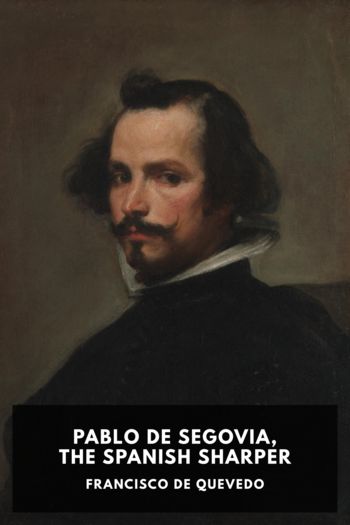Pablo de Segovia, the Spanish Sharper by Francisco de Quevedo (e book reading free TXT) 📕

- Author: Francisco de Quevedo
Book online «Pablo de Segovia, the Spanish Sharper by Francisco de Quevedo (e book reading free TXT) 📕». Author Francisco de Quevedo
In 1634 Quevedo, being in his fifty-fourth year, married—to the surprise, and somewhat to the amusement, of his friends. His way of life hitherto had scarcely been such as to proclaim his confidence in the married state; and a letter which he had written to his friend, the widowed Duchess of Lerma, on the qualities required of a wife, had seemed to set his standard of taste so high as to condemn him to celibacy. His wife died soon after their marriage, leaving Quevedo with fresh troubles, arising out of his satirical humour, or rather from his reputation for satire. He had betaken himself, after his wife’s death, to his country retreat at Torre de Juan Abad to seek consolation in literature; and this was probably his busiest period of production. He wrote a life of Marcus Brutus, of which the scarcely concealed intention was to point to the Caesar who then tyrannized over Spain. He aimed satires in verse, after the classical model, at the reigning favourite. He wrote the Politica de Dios y Gobierno de Cristo (Policy of God and Government of Christ), which, under the guise of a religious work, was a biting satire on the King and the Count-Duke. He wrote other works, some of which have perished, distinguished by elegance of style and energy of expression, none of them deserving of more than a passing mention, and all belonging rather to the political history than to the literature of Spain. To this period also, probably, are to be referred the greater part of those satirical works, under the name of Visions, which have chiefly contributed to make the name of Quevedo known to the nations outside of Spain—those bitter, half-humorous, half-serious, and all-fantastical inventions, such as “The Dream of Skulls” and “The World Inside Out.”
In 1639, when it might have seemed to him that Fortune had already done her worst to plague him, and he had no more either to hope or fear from kings or ministers, there happened to Quevedo the worst of all the calamities which marked his busy and troubled life. A satirical sonnet was found under the King’s napkin at supper, which contained violent reflections on the Government of the Count-Duke Olivares. Quevedo was believed to be the author, and, without any inquiry or trial, he was seized at dead of night, in the Duke of Medina Celi’s palace, and hurried off to a dungeon under the cells of the Royal Convent of San Marcos at Leon. Here he was kept in strict confinement for nearly four years, in spite of a pitiful appeal to Olivares, in which, while protesting his innocence of the offence imputed to him, Quevedo wrote: “No clemency can add many years to my life; no rigour can take many away.” He was asked to declare which of the many satires there were going about were his and which were not, but he returned a proud and disdainful answer. The real author of the lampoon for which Quevedo was punished was discovered soon after, but this made little or no difference in the treatment to which he was subjected. In vain did he entreat the Count-Duke for justice and relief. He pleaded that he was blind of the left eye, crippled, and afflicted with ulcers, declaring that he sought not liberty but change of regimen and of prison, “and this change, the gospel says, Christ granted to a great number of devils who besought it of Him.” In vain were all these pleas. They were probably glad to be able to silence, on any pretext, that bold and biting tongue, which had already done so much to proclaim to posterity the iniquities of the Government. It was not until after the fall of the Count-Duke himself, amidst the rejoicings of the whole nation, that Quevedo was restored to liberty. But his four years’ imprisonment, during part of which time he had been treated, as he complains, “like a wild





Comments (0)